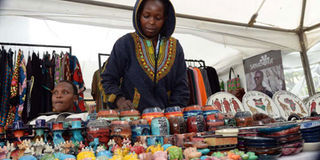Breaking News: At least 10 feared to have drowned in Makueni river
Kenya to help protect, exploit marine resources

A trader displays her wares during the Sustainable Blue Economy Conference at the KICC in Nairobi on November 26, 2018. The conference brings together several head of states and Governments. PHOTO | SALATON NJAU | NATION MEDIA GROUP
What you need to know:
- While Kenya’s territorial waters as well as inland lakes and rivers hold promise for industrial fishing, aquaculture and marine tourism, they remain unexplored.
- Kenya’s stand on this issue is informed by the fact that there must be collective agreement, since two-thirds of global waters lie beyond national jurisdictions.
- President Museveni said his administration has resorted to unorthodox methods to get those living on wetlands to leave.
- During the three-day conference, stakeholders will deliberate on the opportunities and challenges of the blue economy.
Kenya has joined the countries that have committed to work together to formulate solutions that not only keep their marine and aquatic resources safe, but also boost their economies.
The announcement was made by President Uhuru Kenyatta during the opening of the first global Sustainable Blue Economy Conference in Nairobi on Monday.
It was informed by the realisation that capitalising on the newer areas of the blue economy — using seas, oceans and lakes and their resources to improve livelihoods and create jobs — can spur economic growth.
MARINE TOURISM
While Kenya’s territorial waters as well as inland lakes and rivers hold promise for industrial fishing, aquaculture and marine tourism, they remain largely unexplored.
And President Kenyatta, like other leaders at the event held at the Kenyatta International Convention Centre, noted that the growth of the blue economy will promote trade, increase revenue from exports and reduce unemployment.
He was categorical that global leaders should pay more attention to the impact of human action on the health and productivity of maritime resources, while adopting transformative ways of using and sustaining oceans, seas, lakes and rivers.
Kenya’s stand on this issue is informed by the fact that there must be collective agreement, since two-thirds of global waters lie beyond national jurisdictions.
NEGATIVE EFFECT
“Action in one sea will have a positive or negative effect on other seas,” the President said, “We have paid inadequate attention to the impact of human action on the health and productivity of our waters and as a result, many of the ocean systems are under immense stress. Their ability to act as a climate regulator and as a key engine for economic growth and sustainable development is being progressively eroded.”
“We are already experiencing the impact of climate change, which risks triggering rising temperatures that could flood and destroy large sections of our coastal economies,” he said.
Meanwhile, Ugandan President Yoweri Museveni was more categorical that those who have encroached on riparian land must move out.
President Museveni said his administration has resorted to unorthodox methods to get those living on wetlands to leave.
INVADED WETLANDS
“We are trying to bribe our people who invaded wetlands to get out. It is a type of bribe but it’s better than using crude methods because we might also lose votes if they are violently evicted,” he said.
A veteran of public lectures on policies, the Ugandan leader said the blue economy is matter of survival, adding that there is a need to adopt proper farming methods since only concerted efforts will facilitate the exploitation of marine resources.
Earlier, the Ugandan leader had launched a scathing attack on international groups and dismissed an expert who had made a presentation saying, “I really don't pay a lot of attention to international groups. They really waste a lot of our time talking about things that are not well thought about.”
EASY MONEY
“The two problems facing the environment in the world are greed in Europe and the Western world. People want shortcuts and easy money. Here in Africa, it is the combination of greed and necessity. The blue economy is about life. There is no life without water. We must find a way to highlight the linkage to the survival of our species,” President Museveni added.
During the three-day conference, stakeholders will deliberate on the opportunities and challenges of the blue economy.
Concrete commitments and practical actions that can be taken to help the world transition to the blue economy will also be discussed.
Already, the government has formed a committee tasked with coordinating and overseeing the implementation of programmes aimed at developing the blue economy, which will be briefing the president on the sub-sector's progress.
MARINE RESOURCES
In addition, there are the proposed addition to the Fisheries Management and Development Act 2016 to help Kenya use its marine resources for economic growth.
The Kenyan port of Mombasa is the largest and most important gateway to Eastern and Central Africa, which have a combined population of more than 300 million people.
According to the Kenya Maritime Authority, the country's territorial waters measure approximately 221,778 square kilometres, with an exclusive economic zone stretching 350 nautical miles and strategic inland water bodies covering approximately 10,812 square kilometres.
Information from the authority shows that the coastline lies along a major maritime trading and tanker routes between Europe, the Far East and the Americas.
Local communities, the immediate beneficiaries of the oceans, are being sensitised to the impact of climate change and pollution.






